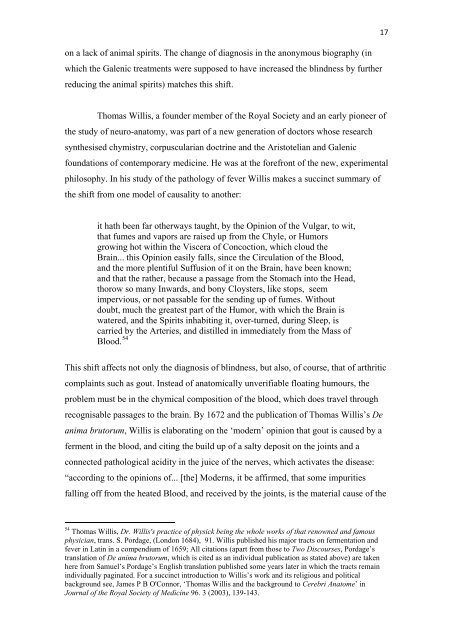Medical Science and the Anatomia Animata in Milton's Paradise Lost
Medical Science and the Anatomia Animata in Milton's Paradise Lost
Medical Science and the Anatomia Animata in Milton's Paradise Lost
You also want an ePaper? Increase the reach of your titles
YUMPU automatically turns print PDFs into web optimized ePapers that Google loves.
on a lack of animal spirits. The change of diagnosis <strong>in</strong> <strong>the</strong> anonymous biography (<strong>in</strong><br />
which <strong>the</strong> Galenic treatments were supposed to have <strong>in</strong>creased <strong>the</strong> bl<strong>in</strong>dness by fur<strong>the</strong>r<br />
reduc<strong>in</strong>g <strong>the</strong> animal spirits) matches this shift.<br />
Thomas Willis, a founder member of <strong>the</strong> Royal Society <strong>and</strong> an early pioneer of<br />
<strong>the</strong> study of neuro-anatomy, was part of a new generation of doctors whose research<br />
syn<strong>the</strong>sised chymistry, corpuscularian doctr<strong>in</strong>e <strong>and</strong> <strong>the</strong> Aristotelian <strong>and</strong> Galenic<br />
foundations of contemporary medic<strong>in</strong>e. He was at <strong>the</strong> forefront of <strong>the</strong> new, experimental<br />
philosophy. In his study of <strong>the</strong> pathology of fever Willis makes a succ<strong>in</strong>ct summary of<br />
<strong>the</strong> shift from one model of causality to ano<strong>the</strong>r:<br />
it hath been far o<strong>the</strong>rways taught, by <strong>the</strong> Op<strong>in</strong>ion of <strong>the</strong> Vulgar, to wit,<br />
that fumes <strong>and</strong> vapors are raised up from <strong>the</strong> Chyle, or Humors<br />
grow<strong>in</strong>g hot with<strong>in</strong> <strong>the</strong> Viscera of Concoction, which cloud <strong>the</strong><br />
Bra<strong>in</strong>... this Op<strong>in</strong>ion easily falls, s<strong>in</strong>ce <strong>the</strong> Circulation of <strong>the</strong> Blood,<br />
<strong>and</strong> <strong>the</strong> more plentiful Suffusion of it on <strong>the</strong> Bra<strong>in</strong>, have been known;<br />
<strong>and</strong> that <strong>the</strong> ra<strong>the</strong>r, because a passage from <strong>the</strong> Stomach <strong>in</strong>to <strong>the</strong> Head,<br />
thorow so many Inwards, <strong>and</strong> bony Cloysters, like stops, seem<br />
impervious, or not passable for <strong>the</strong> send<strong>in</strong>g up of fumes. Without<br />
doubt, much <strong>the</strong> greatest part of <strong>the</strong> Humor, with which <strong>the</strong> Bra<strong>in</strong> is<br />
watered, <strong>and</strong> <strong>the</strong> Spirits <strong>in</strong>habit<strong>in</strong>g it, over-turned, dur<strong>in</strong>g Sleep, is<br />
carried by <strong>the</strong> Arteries, <strong>and</strong> distilled <strong>in</strong> immediately from <strong>the</strong> Mass of<br />
Blood. 54<br />
This shift affects not only <strong>the</strong> diagnosis of bl<strong>in</strong>dness, but also, of course, that of arthritic<br />
compla<strong>in</strong>ts such as gout. Instead of anatomically unverifiable float<strong>in</strong>g humours, <strong>the</strong><br />
problem must be <strong>in</strong> <strong>the</strong> chymical composition of <strong>the</strong> blood, which does travel through<br />
recognisable passages to <strong>the</strong> bra<strong>in</strong>. By 1672 <strong>and</strong> <strong>the</strong> publication of Thomas Willis’s De<br />
anima brutorum, Willis is elaborat<strong>in</strong>g on <strong>the</strong> ‘modern’ op<strong>in</strong>ion that gout is caused by a<br />
ferment <strong>in</strong> <strong>the</strong> blood, <strong>and</strong> cit<strong>in</strong>g <strong>the</strong> build up of a salty deposit on <strong>the</strong> jo<strong>in</strong>ts <strong>and</strong> a<br />
connected pathological acidity <strong>in</strong> <strong>the</strong> juice of <strong>the</strong> nerves, which activates <strong>the</strong> disease:<br />
“accord<strong>in</strong>g to <strong>the</strong> op<strong>in</strong>ions of... [<strong>the</strong>] Moderns, it be affirmed, that some impurities<br />
fall<strong>in</strong>g off from <strong>the</strong> heated Blood, <strong>and</strong> received by <strong>the</strong> jo<strong>in</strong>ts, is <strong>the</strong> material cause of <strong>the</strong><br />
54 Thomas Willis, Dr. Willis's practice of physick be<strong>in</strong>g <strong>the</strong> whole works of that renowned <strong>and</strong> famous<br />
physician, trans. S. Pordage, (London 1684), 91. Willis published his major tracts on fermentation <strong>and</strong><br />
fever <strong>in</strong> Lat<strong>in</strong> <strong>in</strong> a compendium of 1659; All citations (apart from those to Two Discourses, Pordage’s<br />
translation of De anima brutorum, which is cited as an <strong>in</strong>dividual publication as stated above) are taken<br />
here from Samuel’s Pordage’s English translation published some years later <strong>in</strong> which <strong>the</strong> tracts rema<strong>in</strong><br />
<strong>in</strong>dividually pag<strong>in</strong>ated. For a succ<strong>in</strong>ct <strong>in</strong>troduction to Willis’s work <strong>and</strong> its religious <strong>and</strong> political<br />
background see, James P B O'Connor, ‘Thomas Willis <strong>and</strong> <strong>the</strong> background to Cerebri Anatome’ <strong>in</strong><br />
Journal of <strong>the</strong> Royal Society of Medic<strong>in</strong>e 96. 3 (2003), 139-143.<br />
17
















